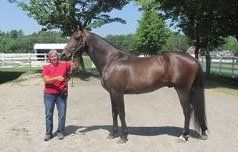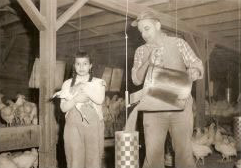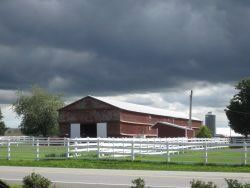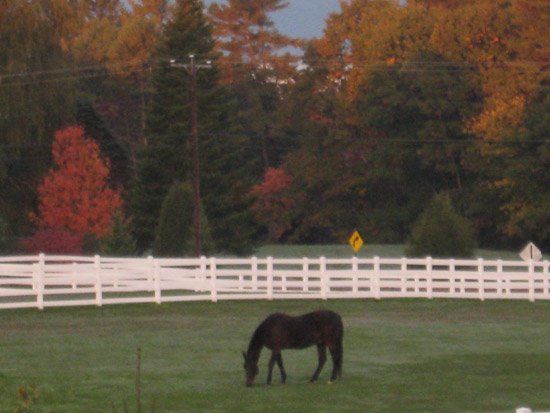Harness racing has enjoyed a rich and varied history in the state of Maine. The "kite track" at Old Orchard Beach was a Grand Circuit stop in the early 20th century, boasting a 1:57 track record set there by the immortal Greyhound in 1939.
Around that same time, a man from nearby Saco was working on his family's dairy farm, dreaming of the day that he would own a farm of his own.
That man, named Raymond Dupuis, realized his dream in 1958, founding Dupuis Farm, just seven miles from the now-closed venue at Old Orchard Beach. Over the years, the farm has housed poultry, cattle, hogs and Quarter Horses, but since the mid-1980s, it has been one of New England's leading breeders of Standardbred horses, thanks to the hard work of Dupuis's daughter, Lynn- Marie Plouffe.
"We have realized our dream and we have accomplished our goal right here in Maine," Plouffe said. "Saco has always been my hometown. We are very happy here."
For nearly three decades the farm has been successful in the breeding business. Plouffe does much of the heavy lifting, from booking mares to collecting stallions to shipping semen, but Raymond, now 93, can still be found helping, especially during haying time.
The story of Dupuis Farm begins in the early 1900s, when Eugene and Rose Dupuis, Lynn- Marie's grandparents, arrived from St. Norbic, Quebec, with intentions of dairy farming. The Biddeford/Saco area, with their mills and factories, proved to be a logical setting for the delivery of milk, and the first Dupuis Farm was established at this location just three miles north of the town.
The children, seven boys and three girls, did the necessary chores on the farm until they grew up and left home. When Raymond, the oldest son, was 22, he met and married Margaret Morin of Biddeford. The young couple did not have much time before he was drafted into the Army.
Upon his return 28 months later, Dupuis needed a job. He was hired by the Mahany Company where he worked on industrial plumbing contracts throughout New England for the next 20 years, quietly holding off on his longtime desire of returning to life on the farm.
Meanwhile, Margaret was very busy as the family grew; first Susan in 1945, followed by Bridget in 1949 and finally Lynn-Marie in 1951.
In 1958, Dupuis realized his dream, having purchased 55 acres of land from his father, just three miles from the original family farm. Dupuis decided to try raising poultry first. A large barn was built and 30,000 chickens were purchased. Lynn-Marie, always an animal lover, said she was overjoyed to go to the farm every day after school and return home at night with her father.
By 1963, Dupuis built the first fully-automated windowless poultry barn (322 x 42) in the country and filled it with 90,000 chickens. The farm also housed some 150 beef cattle and 25 hogs. Champ, a Morgan horse, was added to the mix. He was the first of many horses to come into Lynn's life. She could be seen every day riding her constant companion in the nearby fields and on the roadsides.
"He lived a happy life for 22 years and never left the farm," she said.
Plouffe attended Virginia Intermont College for their program in Equine Sciences. Upon her return, the decision was made to build a small home on the farm property, which enabled her to check on things and oversee the farm maintenance on a continuous basis.
"We have never tried to be fancy, but we try to be efficient in everything that we do," she said.
In the early '80s, when the chicken business "went South," father and daughter decided to look elsewhere for farm income. Plouffe was quick to realize the popularity of the versatile Quarter Horse in the New England area.
The farm began offering boarding and training for these horses and their owners. The regulation riding ring, plus the access to nearby trails, attracted the locals which led to the construction of a few stalls in the vacant main barn.
With this new addition, Quarter Horse breeding, riding and showing competitively became the highlight at the Dupuis Farm.
Meanwhile, the harness horse industry was seeing a renaissance in New England. In the 1970s, the newly established Maine Sire Stakes program looked very promising to those in the racing business at that time. Dupuis Farm, with its location just two miles from the Maine Turnpike, was contacted by Sharlu Farms of Massachusetts about standing a stallion for the Maine Sire Stakes program, as location in the state was a prerequisite for eligibility. Neither father nor daughter was knowledgeable about the racing game.
"I grew to love these harness racehorses because they are beautiful 'action' animals, but they have retained their calm temperament and are easily trainable," she said. "Plus as 2- and 3-year-olds these colts and fillies have the opportunity of making extra money as the state supplements their purses.
"It's better to have dollars than ribbons at the end of the season."
The 322-foot former poultry barn now houses the farm's Standardbred breeding operation.
In 1983, the stallion Rebel Bret p, T1:57.3 (Bret Hanover-Propeller) was delivered with the promise of eight stalls to house his expected harem.
The existing stalls filled immediately and a total of 20 more were added on a daily basis during the next month. The 300-ft. former chicken barn was nearly full of horses by the end of the breeding season.
With the influx of more horses, breeding methods began to improve. As artificial insemination gained a foothold, making breeding much safer and more successful, Plouffe furthered her education by attending seminars at Cornell University and Texas A & M.
Today she is one of the most proficient and successful proponents of artificial insemination and semen transport in the business. Her hands-on operation includes large, safe, grass paddocks near the main barn, so that mares can be teased daily and then turned out; the use of the phantom and artificial insemination or transported semen; and a 16-hour lighting program so that mares will cycle sooner, making it easier to get them in foal.
Lynn met and married Bruce Plouffe in 1993. Bruce owns B & P Construction, a remodeling business, but he is quick to add his expertise to improve the family farm. The eye-catching 25,000 feet of white vinyl fencing and automatic gates are his most recent projects.
"My dad now lives in a home that Bruce remodeled at our Buxton Road entrance," said Lynn. "My son, Roger, lives at the New County Road entrance to the farm. Bruce and I just completed building a new home on this property with a view of the fields and the horses."
"[Lynn] always lets you know what is going on, regardless if it's good news or bad," said Tom Dillon. "She's very honest."
"Lynn foals out our 10 mares and re-breeds them," he said. "Half of them are staked in Maine and the rest are outside. We've also had ongoing good luck with Likeabatoutahell, Whispering Wind, Apple Plush, plus some of our yearlings have sold well at the major sales.
"She's a tireless worker, extremely capable and conscientious."
The farm stands, Baron Biltmore - Kasa Branca - Baroness Biltmore . He is the sire of 3 in 1:53, 5 in 1:55, 12 in 1:57, 15 in 1:59. Western Maverick's progeny have earned over $10 Million in earnings with a $53,000 average earnings per starter! As two-year old Maverick set a world record winning the Abe Lincoln Pace by 4 lengths in 1:53h at Maywood Park.
For 2013 the roster of Trotting sires include Boy Band (Lindy Lane-Classic Casette), owned by Mike Andrew, president of the Maine Standardbred Breeders and Owners Association.. Be sure to have a look at his pedigree! He is the sire of 3 in 1:56, 5 in 2:00 including BAD BOY BILLY 2, 2:02.3h, 3, 1:58.3h, 1:55.3 -'11 ($283,546) - 27 wins and UP TEMPO 2, 2:04h, 3, 1:59.4h, 1:55.1s -'11 ($257,428) - 26 wins. Noble Venture is from the great Valley Victory mare MARITAS VICTORY 2, 1:59.3s, 3, 1:54 -'00 ($666,731) 7 wins. She is a half sister to double millionaire and multiple Dan Patch Award winner Passionate Glide. Noble Venture's oldest foals are two-year olds in 2013.






